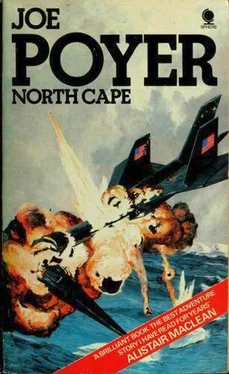It looks like they are surfacing, sir. More of the sail is out — of the water and the decks are coming into view.” A few moments later he said, “Now she’s heaving to… about two miles off the beach, I make it, sir.”
“Probably doesn’t dare go in any closer. In those seas I don’t know as I blame him,” Larkin commented.
“Even inside the fjord, she must be rolling through forty degrees. I pity her crew,” Bridges murmured over Larkin’s shoulder as he _watched the screen. Larkin nodded. “They will have a devil of a time getting a boat off the deck and manned. That’s one operation I would like to see. It would do you good as well, Mr. Bridges. Those new-fangled life spheres don’t call for much of a knack in launching. Swing her over the side and cut her loose. Couldn’t sink one if you tried.”
Bridges made a skeptical noise and Larkin grinned.
“According to the charts, there is a small cove directly in from where the sub is lying,” Bridges pointed out. “But there sure isn’t any shelter there. It faces north, into the winds.”
“Even so, they might get the boat in… but, I sure wouldn’t want to be in it.” On the screen a small shape detached itself from the bulk of the submarine and headed toward the shore. As soon as the boat was away the sub began to submerge. have engine noises, very faintly, sir,” said the sonar operator. “At fifty miles?” Larkin asked incredulously.
“Yes, sir. It might be due to the temperature of the water. I’ve had it happen before, although never this far away from the source.”
“I’ll be damned. What do they seem to *be doing now?” The sonar operator pressed the phones tightly to his head. “As… as near as I can tell… they have just submerged, probably to periscope depth to watch the lifeboat. They don’t seem to be going anywhere.”
“Keep a sharp sonar watch. All engines to stop. Switch to silent running.” Larkin shifted restlessly in his high seat. “If we can hear them, they just may be able to pick us up as well.” The quiet murmuring died throughout the ship as the mechanical gear shut down.
“They might have picked us up already over the noise of their own engines, even though it isn’t likely,” Bridges said as he. moved to. Folsom’s console and strapped himself in, His hands played quickly over the keys and the various panels came alive. Then he ran a quick status check of the ship and its gear before changing over to monitoring the radar and sonar consoles. Deep in the hull, the main sonar and radar rooms, located at opposite ends of the ship for safety, were also keeping a sharp watch, under the direction of the chief petty officer. Certain isolated points might have escaped the human operators, but nothing that appeared to be out of bounds passed the attention of the giant process computer that overmonitored the entire system.
“Just at periscope depth, sir. They don’t seem to be aware of us. I would guess that the changes in the water layers carrying their engine noise is just a fluke. I doubt if it works both ways. And we may lose it anytime,” he pointed out. Larkin nodded. “That may be so, but there is no harm in being careful. I would guess that they haven’t picked us up either. We at least are in international waters. Even so, if they had picked us up they would be getting ready for a fight. In fact, their missiles would probably already be.on the way.”
It took the Russian lifeboat over an hour to negotiate the two miles of angry sea to the cove, and once under the lee of the cliffs it disappeared from their radar, lost in the mass of signal noise reflecting from the rock. From the radar it was impossible.to tell whether the boat had made it in, and the propeller noises from the tiny engine were completely lost over the fifty-mile distance in spite of the reflecting layers of water that had temporarily expanded the senses of the ship.
Larkin touched the switch to the main radio room. “Put your sweep on the speaker system, please.”
A moment later the speakers on the bridge burst into life. Larkin grimaced at a noise that sounded like someone using a cat’s tail to play a musical saw. The radio operator was running up and down the bandwidth with the tuner. A small computer unit monitored and controlled the process, hunting until it picked up a definite signal. For three minutes the noise continued until the wearing howl was broken by a loud whistle, then a Russian voice transmitting a series of call letters broke over. This was followed by another voice spewing a choppy flow of Russian. The transmission was over quickly, to be replaced by the normal static of an unused frequency.
Almost at the same time, the radio operator was back on the speaker. “We have it all taped, sir.”
“Good, get it off immediately with a top priority rating. I want an answer in five minutes, sooner if possible.”
“Aye, aye, sir.”
Larkin got up and walked over to the plotting table, swaying with the motion of the ship. He stared down at the map, then picked up the pair of dividers from their holder and began to measure off the distances between Folsom and the Russians. He walked the dividers carefully over the distance and found that he did not like the story they had to tell. Less than twenty-two miles separated the two groups — twenty-two miles that the Russians would not waste any time at all in covering. The only thing in Folsom’s favor so far was the fact that the Russians did not know exactly where the ship was. But, even so, in spite of the storm and difficult terrain, the Russians would find them within twentyfour hours. He did not know exactly how many troops had been landed, but he was ready to lay odds that they would split up, one party marching along the top of the cliffs where they could search the coastline below while the other moved inland a mile or so. The beach party could not fail to spot the wrecked lifeboat. Once they had that, it would be only a matter of time until they found the camp.
Larkin turned back to his console and dialed the weather channel, although he already knew what it would say. But then one could always hope. So — it was no surprise when he found that both. the Greenland and Iceland weather stations were still predicting: another thirty-six to forty-eight hours of heavy seas and high winds along the Norwegian coast. They expected the winds to begin dropping in about twenty-four hours, but at sea they would remain strong enough to preclude launching the helicopter.
“Damn, damn,” he muttered to himself. Folsom was really in for it now. He returned to the plotting table and bent over the map and with the dividers measured out the distance to the Norwegian Coast Guard Station and then to the NATO base. The distance to the coast guard station was shorter by eight miles, but the route would take them directly into the arms of the Soviets. The only refuge, then, was the Norwegian-manned NATO base, twenty-six miles from where Folsom had pitched the camp — that or the interior of the Cape area, and Larkin doubted whether the pilot would survive for long there.
“Radio room to bridge, we have the translation.”
“Go ahead,” Larkin ordered.
“‘Shore party calling ST-101, shore party calling ST-101.’ This was repeated six times, sir. ‘Then, we have landed without injuries. Lifeboat is badly damaged. Will begin search immediately. Radio contact will be re-established hourly on this frequency.’ End of message. There was no reply from the ship, sir. They used a standard band, shortrange radio at 120 kc.”
“Very good. Establish a continuous monitoring watch as of now. Feed everything you pick up to Virginia, top priority, after running it through the computers for translation. I want Virginia’s literal translation as a check.”
“Aye, sir.”
Читать дальше












